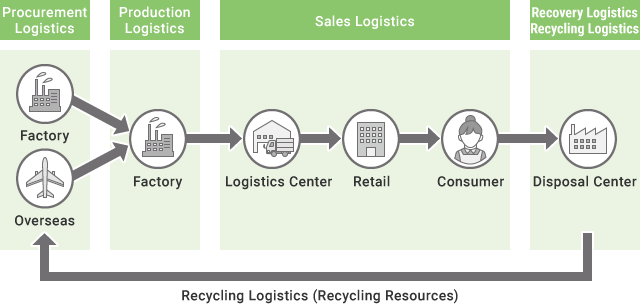Types of Logistics

There are many types of logistics. The most well known type is sales logistics that moves products from the producer to the consumer. In addition, there are a number of other types of logistics, such as procurement logistics which is the flow of raw materials and parts, production logistics which is the flow of materials inside a factory or business, recovery logistics which is the return flow of returns from consumers and waste, and recycling logistics which is the flow of recyclable materials. This section describes the types and fields of logistics in depth.
Logistics Fields
Logistics can be split into five types by field: procurement logistics, production logistics, sales logistics, recovery logistics, and recycling logistics. Each of these is explained in detail, but first we should learn about logistics fields and types. For recovery logistics and recycling logistics, both types are the same up to the recovery of goods from consumers, but recycling logistics is the type that recycles the goods that are collected.
Procurement Logistics: Procuring Raw Materials and Parts
Procurement logistics is the flow of goods when the raw materials and parts necessary for manufacturing are procured from suppliers. This field did not attract much attention before, but now that small-lot production of a variety of models is the main type of production, many firms are actively pursuing production by procuring the necessary materials in only the necessary amounts at the necessary times (the shift to just-in-time production) because it is directly connected to reducing inventory costs.
Production Logistics: Materials Management, Distribution in Factories, Product Management, Shipping
Production logistics is the flow of goods that includes the management of procured parts and materials, distribution inside a factory, product management, packaging, and shipping to warehouse. Delivery management, warehouse dispatch management, and shipping management can be optimized and the state of delivery vehicles can be managed by smoothly linking procurement logistics and sales logistics described later.
Sales Logistics: Delivery from Warehouse to Wholesalers, Retailers, and Consumers
Logistics typically refers to sales logistics. In the past this was mainly delivery from delivery centers and logistics warehouses to distribution points such as wholesalers and retailers. But now direct delivery also makes up a large amount of this volume due to online shopping and e-commerce. Whether delivery through delivery centers and logistics warehouses or direct delivery from production sites, higher efficiency in transportation and delivery and shrinking inventory are indispensable for delivering the necessary goods to the necessary people in the necessary quantities at the necessary time. This also contributes to improving customer satisfaction.
Recovery Logistics: Recovering and Recycling Products, Containers, and Packaging
If the flow of goods from production to consumption by procurement logistics, production logistics, and sales logistics is described using the circulatory system of the body, it would be said to be forward logistics. On the other hand, recovery logistics or reverse logistics is the flow that recovers and recycles products, containers, and packaging that have fulfilled their role. Similar to recycling logistics described later, emphasis is being placed on this flow in recycling-oriented societies.
Recycling Logistics: Recovering and Recycling Recyclable Products and Containers
Typical examples of recycling logistics are recovering and recycling empty cans, plastic bottles, and old paper. Containers, packaging, old computers, and inkjet cartridges can also be recovered and recycled in the same manner. The importance of recycling logistics has been increasing in recent years as measures for the environment and to effectively utilize materials such as minor metals.
Source: https://www.keyence.com/ss/products/auto_id/logistics/basic/field.jsp
Copyright (C) 2024 KEYENCE CORPORATION. All Rights Reserved.

